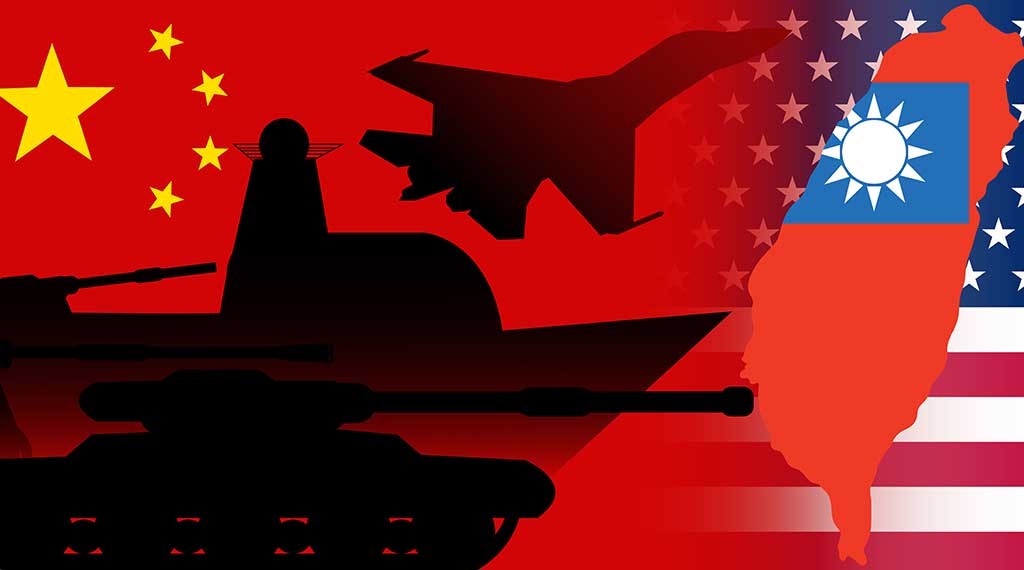
China‘s actions against Taiwan are increasing in scope and intensity. We have documented the exercises around Taiwan, the first (Joint Fire Strike) last August and the second (Joint Anti-Air Raid) last month, and we anticipate a third (Joint Island Landing) this fall, all of which are designed to prepare for the invasion of Taiwan.
Given that the invasion of Taiwan could occur at any time and might come as soon as this year, drastic actions must be taken to deter the People’s Republic of China.
The threat of an invasion of Taiwan is real and increasing in likelihood as evinced by many factors, including the exercises that provide Beijing with the confidence to conduct the invasion without fear of defeat by Taiwan’s forces or allied forces. The exercises were supported and integrated with joint logistics and information dominance.
Moreover, China‘s maritime and aerial penetration of Taiwan’s territory is now routine, increasing frequency and location of the People’s Liberation Army Navy’s carrier operations near Taiwan, Japan and Guam. In addition, Chinese Communist Party leader Xi Jinping’s statements, as well as those from other CCP and government officials, are ever more explicit about realizing their strategic goal of invading Taiwan.
The threat of the invasion of Taiwan is immediate and growing larger. Taiwan matters to U.S. national security for five reasons.
The first is economic. Taiwan is a vibrant and wealthy economy — and a superpower in computer chip production. Any damage to its factories, including their destruction or conquest by China, will reverberate for many years throughout the U.S. and global economies. There may come a day when the U.S. is no longer dependent upon Taiwanese chips, but that day is not today and will not be for many years.
Second, Taiwan occupies key geopolitical real estate. For China, it is a cork in the bottle of the first island chain, and so prevents the Chinese military from easily accessing the Pacific. Taiwan provides close access to mine China’s ports and sustains the sea line of communication from the East and South China seas.
For the U.S. and its allies, Taiwan is valuable for intelligence collection against China and for military bases to threaten China’s forces. Taiwan has stated that there are increasing numbers of U.S. troops on the island, from scores to hundreds. But there should be orders of magnitude more U.S. and allied forces.
Third, in the realm of political warfare, Taiwan is a strong democracy. It demonstrates what China might have been had the CCP not come to power or if it had been overthrown. Taiwan’s existence is a daily reminder of why the CCP is illegitimate.
Fourth, Taiwan is a symbol of U.S. credibility to resist Chinese aggression and thus sustain stability. Standing with Taiwan, as then-House Speaker Nancy Pelosi did in August 2022 and current Speaker Kevin McCarthy accomplished in April, provides a tangible indication that the U.S. will resist China’s expansion.
In sum, Taiwan is the new central front. The locus of where the formidable threat is met by indomitable political willpower to respond is coupled with robust conventional and nuclear military capabilities to deter attack. This is how NATO on its central front deterred a Warsaw Pact attack during the Cold War.
Regrettably, although the U.S. conventional force posture on Taiwan is slated to grow, it remains insufficient, as is the presence of U.S. allies. U.S. allies in the Indo-Pacific should consider temporary air and naval group deployments to Taiwan in the same way that NATO forces provide similar support for Estonia, Latvia and Lithuania. Conventional deterrence, however, remains insufficient given the static U.S. force posture in the region over the past 30 years, especially in comparison with the PLA’s massive modernization over the same time frame.
Given the urgency of increasing deterrence for Taiwan, we propose bringing U.S. B-61 tactical nuclear weapons into the Western Pacific, specifically to Taiwan. The U.S. has fewer than 200 B-61s stationed across five NATO bases, and some number of these could be moved to Taiwan and to bases in the theater, including Guam and Okinawa.
In time, as nascent U.S. rotational access to bases in the Philippines matures, basing of such weapons should also be considered.
Work would have to be quickly accomplished to ensure the safe, secure and survivable basing of U.S. airmen, weapons and U.S. aircraft. The essential element is to have the weapons in the theater, perhaps rotating the weapons and aircraft from host countries. NATO allies would have concerns about any drawdown of the arsenal in Europe. Still, some would remain to deter a Russian conventional invasion or tactical nuclear weapons use against a NATO member.
Augmenting conventional forces on Taiwan and placing B-61s in theater is an important step to deter a Chinese attack and reassure allies of the U.S. determination to deter an invasion of Taiwan. The CCP’s determination to invade Taiwan in the near term compels bold measures to strengthen deterrence so the Sino-American cold war remains cold. U.S. diplomats and military leaders must make this case to the people of Taiwan, who may consider this escalatory.
In reality, peace can come only through real strength, and action is needed now.
- Victory over the PRC: Why engagement makes war with Beijing more likely - April 24, 2024
- The US must end engagement (and Biden’s neo-Engagement) with the PRC now - April 10, 2024
- How to address the CCP threat: Engagement, defeatism, or victory - April 3, 2024
